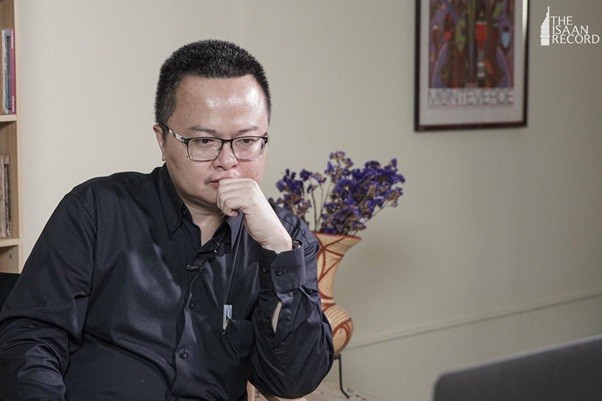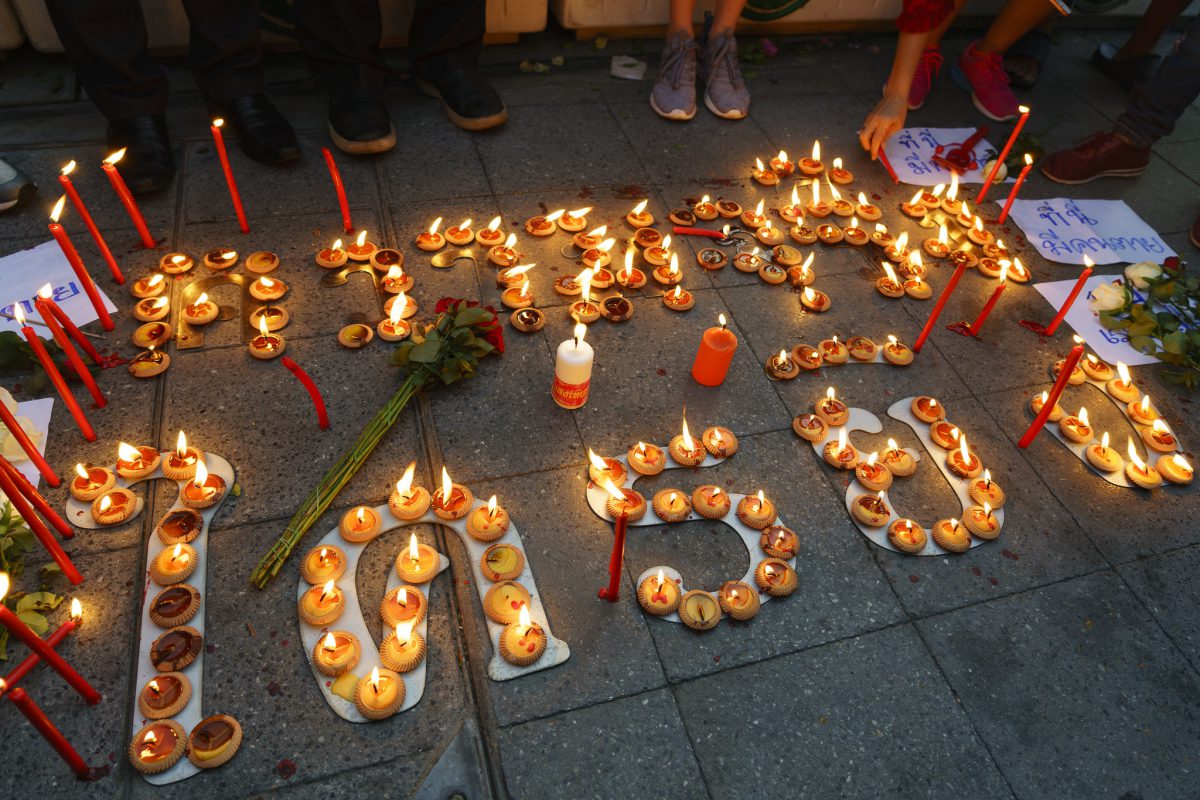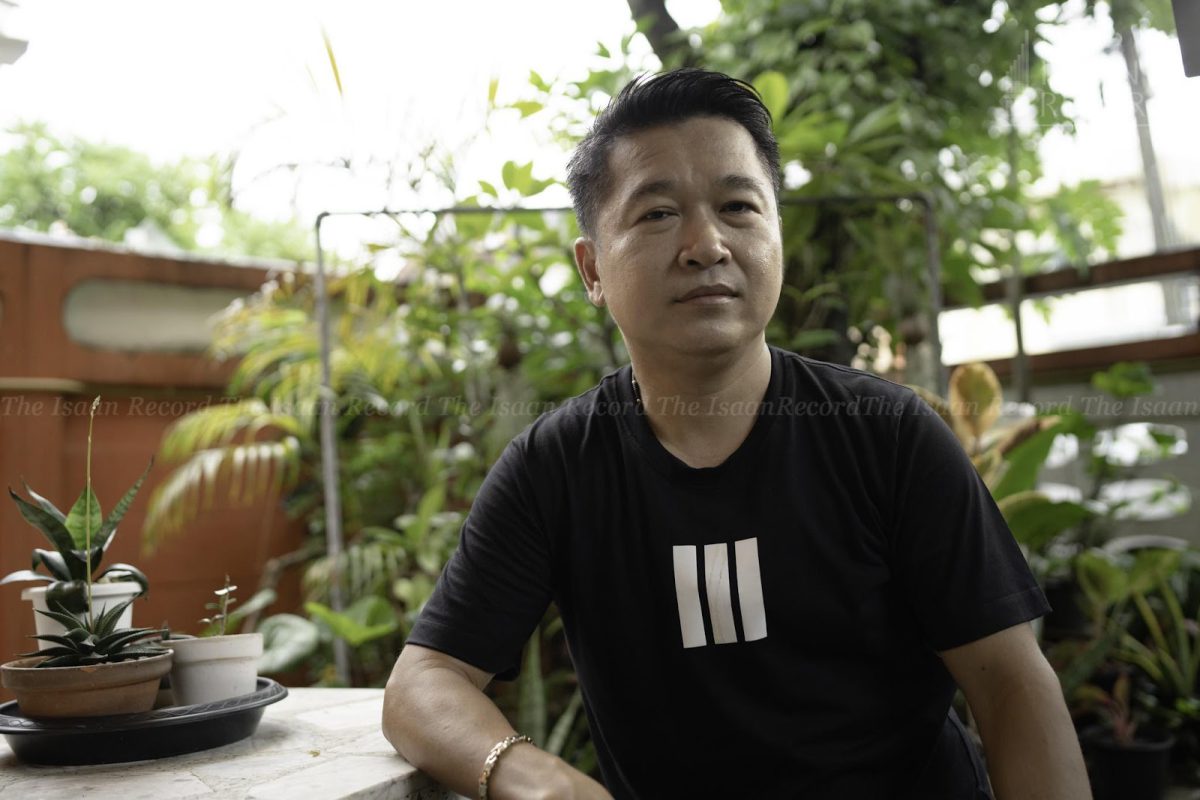
By Hathairat Phaholtap
The calls for reform of the monarchy has never been so loud, or so strong, as in 2020. The Isaan Record invited Anon Nampha, a controversial human rights lawyer—and probably Thailand’s bravest orator—to speak his mind via a live online broadcast titled, “From Harry Potter to Reform of the Monarchy.”
After the Harry Potter-themed protest—official slogan, “Casting a Spell to Expel You-Know-Who”—on August 3, 2020 at the Democracy Monument in Bangkok shocked wider society with its forthrightness, the bar for frank discussion of the monarchy in public seems to have been irrevocably raised.
The Isaan Record: What was the last straw that forced you to dress up as Harry Potter and speak about the monarchy on stage?
Anon Nampha: Reform of the monarchy has been a main talking point of public protests since the beginning of 2020, when the Future Forward Party was dissolved. At that time, I didn’t see the protesters—mostly students and young people—criticizing the Constitutional Court as much as they were criticizing the monarchy.
I think that most people have been questioning the role of the monarchy since the protests began. In fact, the monarchy had been a subject of criticism on Twitter long before the protests, both in the abstract and in more mundane terms such as the royal motorcades that periodically paralyze traffic for us commoners. At our first rally at Kasetsart University, the monarchy was spoken about but in veiled terms, without any direct references. We’d refer to him as “the person in Germany,” “the cyclist,” or “Justin.” But after COVID-19 came along, people became a lot more direct with their words, such as at the rally on July 18—as you can see from the signs they were holding.
I said to Kasetsart University students and others who took part in the organizing the event that we have to go all out, “go official” in talking about this topic on August 3. I happened to have quite a bit of information on the topic. I’d been closely following the steady increase of Rama X’s scope of power since he ascended to the throne. There was lots to talk about.
On that day, I got up on stage and said that it’s time we started speaking frankly about “the person in Germany,” “the one who flies in and out,” using our taxes. Who is he? Well, he’s our King, that’s who. The entire audience was speechless. Dumbfounded, like, “Can we actually say that?”
 Anon Nampha speaking on stage at a rally on July 19, 2020. Photo from his Facebook.
Anon Nampha speaking on stage at a rally on July 19, 2020. Photo from his Facebook.
IR: Is it “time to speak frankly” because the behavior of the King is controversial and harder to support?
AN: I think it’s also a matter of clarity. In Rama IX’s day, there were many times when he stuck his oar into politics. Whether he was actually averting crises or causing them is another matter. But either way, nobody really dared to discuss or question his actions. It really cannot be denied that Rama IX’s influence and prestige set the ceiling very high.
But when it comes to Rama X, there’s a certain clarity to everything. His power-grabs are very clear, much clearer than the moves made by Rama IX. And now, during the COVID-19 crisis, it has become even clearer to the populace that he prefers to live in Germany rather than stand with his own kingdom.
I think this is why people are starting to ask questions. People under 30 didn’t grow up to believe that we owe our existence to the king or to be grateful for it. People of my generation will out of practicality stand up to the Royal Anthem by reflex. Just hearing that song while sleeping would jerk us awake to stand up. We had all kinds of propaganda funnelled into our minds. But not the youth of today, who are campaigning to stop the tradition of standing up for the Royal Anthem in cinemas.
IR: There’s a trending hashtag on Twitter along the lines that soon-to-be-graduating students should decline taking part in official graduation ceremonies, so as to avoid contact with members of the royal family. Is this a sign that royal influence is waning with the younger generations?
AN: I’ve been following this discussion on Twitter. There has been a very frank exchange regarding Rama X and his conduct. Such as when he said he was coming at 2 p.m. but instead came at 2 a.m.—which really happened. At many graduation ceremonies in various universities, he’s failed to show up on time. Then there’s the discussion about his growing powers. To me, it’s a legitimate and peaceful response to what they have encountered in their lives. It’s also a way of telling the rest of society in very clear terms that they’re not going to display the kind of blind loyalty that other parts of society might expect.
IR: One thing that was spoken about on August 3 was the idea of legal curbs to royal prerogatives. How would that work?
AN: First of all, the constitution has to be rewritten. The monarchy must come under the constitution, not loom over it. The monarchy ought to be advised by the government, not the other way round. When the constitution has been changed, then the laws can be changed in due process, which will involve campaigning in the provinces, too.
IR: One in ten students wish to see Section 6 of the constitution expanded to allow people to have recourse against the monarchy Do you think this is possible?
AN: I think Section 6 lies at the very heart of the concept of equal justice before the law. There shouldn’t be anyone, in the government or otherwise, who can do anything with complete immunity from prosecution. If we were really a democracy with a constitutional monarchy, where the monarchy doesn’t have undue influence in politics, and doesn’t act by fiat, Section 6 wouldn’t be in question. It’s the only section in the constitution that is supposed to guarantee equal justice in society, that if you do wrong you will face justice.
In most civilized countries that still have a monarchy, it would be unthinkable for a monarch to be taken to court. The monarchy is in its own corner, doing its own thing. But if the monarchy were to come under the constitution, there wouldn’t be any room for it to be anything other than equal to other citizens before the law.
If they do wrong, they have to face justice. This was debated in parliament around 60 years ago. An MP, I can’t remember his name, posed the question that if the king shot the prime minister dead, would the King have to face justice in a court of law? Quite a heated debate ensued and the goalposts of the debate kept changing. But eventually it was concluded that the king would not have to face any consequences at all for that hypothetical action.
If we are to bring the monarchy under the constitution, meaning that it would be truly equal to ordinary citizens in the eyes of the law, we will have to amend Section 6. Perhaps another organization would have agency over the monarchy in these situations. For example, the first constitution after 1932 stated that the monarchy was immune from prosecution in a court of law, but was not immune from sanctions by parliament. Some countries actually allow their supreme courts to have jurisdiction over the monarchy. There has to be consequences to wrongdoing. Otherwise the basic premise that all are equal before the law is meaningless.
 Anon dressed as Harry Potter during a protest at Democracy Monument on August 3, 2020. Photo from his Facebook profile.
Anon dressed as Harry Potter during a protest at Democracy Monument on August 3, 2020. Photo from his Facebook profile.
IR: Would this be along the lines of the book Raeng Ngan Vichan Chao [A laborer’s critique of the King], in which a common laborer was able to take Rama VII to court? Would an amendment of Section 6 take us to that model?
AN: It’s the same idea. If people were to say “OK, but what if people who don’t like the anti-monarchists just use it to take spurious legal action against the monarchy?” then we design and refine it further. You might, for example, put in a clause that says you can’t just sue the monarchy by yourself but your claim has to be vetted by another trusted intermediary first, or some other kind of due process. It is possible to design a process that’s fair. But the main point is that the monarch has to be accountable to the law. If they violate a criminal or civil law, they ought to be held accountable. It’s as simple as that.
IR: Do you think that we will ever have an atmosphere where people are free to talk about the monarchy however they please, wherever they please?
AN: It’s certainly a dream of some people. But you know what? Even some yellow shirts will gossip about the monarchy over drinks, just like some red shirts do. I’ll bet you anything that they also have those video clips, messages, and articles—that they cry “lese majeste” at us for—on their phones. But I just don’t think that this kind of idle gossip has any value at all.
IR: Do you attribute the rise in open discussion about the monarchy on the prime minister’s announcement that the king has forbidden the use of Article 112?
AN: This is something that General Prayut should never have said. It’s tantamount to saying that the king is above the law, and that he’s able to arbitrarily say on a whim that this law is in or this law is out. He should never have openly referenced the king. It’s a double-edged sword.
In the past, the use of 112 may have served to make people fearful of speaking out about the monarchy, but to use it today would only serve to reinforce the point that its use is [a form] of arbitrary injustice. I have to admit that, in some ways, I’d have them dare to use it again. Since General Prayut said that the King said not to use it again, if they did start using it again, it would just show the utter capriciousness of the whole thing, that this one man can turn laws on and off again like a switch against the general population. But in some ways we’re already past that point because even the hysterics of the right-wing and the royalists are crossing into [Article] 113 territory [sedition or insurrection against the legislative power and the constitution]. The 112 issue is actually relatively minor in comparison.
IR: Do you want Thailand to continue being a monarchy?
AN: It is my sincere hope and expectation that the monarchy will continue to exist under the constitution. The new generation has had a different set of experiences to those who came before them, so their thinking is accordingly different. And of course, the experiences of those younger than my 36 years will be even more different again. That’s all I can foresee. Beyond that, if the monarchy were to be abolished like so many of the younger people are calling for, I just can’t see it.
But most importantly, I would like to see the monarchy change and adapt. Society today will not tolerate a regression; it can only go forward from here. If there is no change, no adaptation, the forces propelling us into the future could become dangerous. Our society has seen radical departures of opinion within itself before, and each time it resulted in loss for all sides.
IR: Have you ever considered that your speaking out about the monarchy will result in exile, or worse, a gruesome assassination like those who were murdered and thrown into the Mekong River?
AN: Even if I declared tomorrow that I’d stop speaking about this, I’d still act as a lawyer for the students anyway. If they decided to shoot up the bar that I frequent, I’d die. If I wasn’t a leader, if I didn’t speak on stage, I’d still go to the protests. If they fired into the protesters, I might be among those killed, too. There is no difference between being a protest leader speaking on stage and being a protester listening to the speech. The voice on stage is the voice of everyone protesting. I believe that if what I’m saying resonates so strongly with so many people, then I have a duty to make the most of the opportunity to speak.
 “I would like His Majesty to make some changes to the way he wields his power. When all’s said and done, I think that we’d be able to coexist. I really believe that.”
“I would like His Majesty to make some changes to the way he wields his power. When all’s said and done, I think that we’d be able to coexist. I really believe that.”
IR: If you could say something to the King right now, what would you say?
AN: If he is listening, I would like to think that he would be boss enough to speak freely and frankly about things, and to genuinely listen to what’s being said, too. Whether he chooses to change, adapt, or reform is another matter altogether.
I think that he has to pay heed to what the students are saying since he is the King. He should listen and speak to them in straightforward terms. Don’t muzzle the students and don’t allow the people at your side to muzzle the students, either. Don’t allow the military to bully the students or other citizens just for speaking about this matter frankly and freely.
I think that he is listening. I would like His Majesty to make some changes to the way he wields his power. When all’s said and done, I think that we’d be able to coexist, and we’d be able to build a nation with freedom and equality so that we could all coexist.
I think that if he is adamant about refusing to change with the times, the chances of younger generations setting the sights on something that goes far beyond a constitutional monarchy are quite high. This is not a threat but a straightforward message about an imminent possibility that is fast becoming a probability. We must have sober, reasoned dialogue about this. We must be able to speak the truth to each other for meaningful change to occur.




